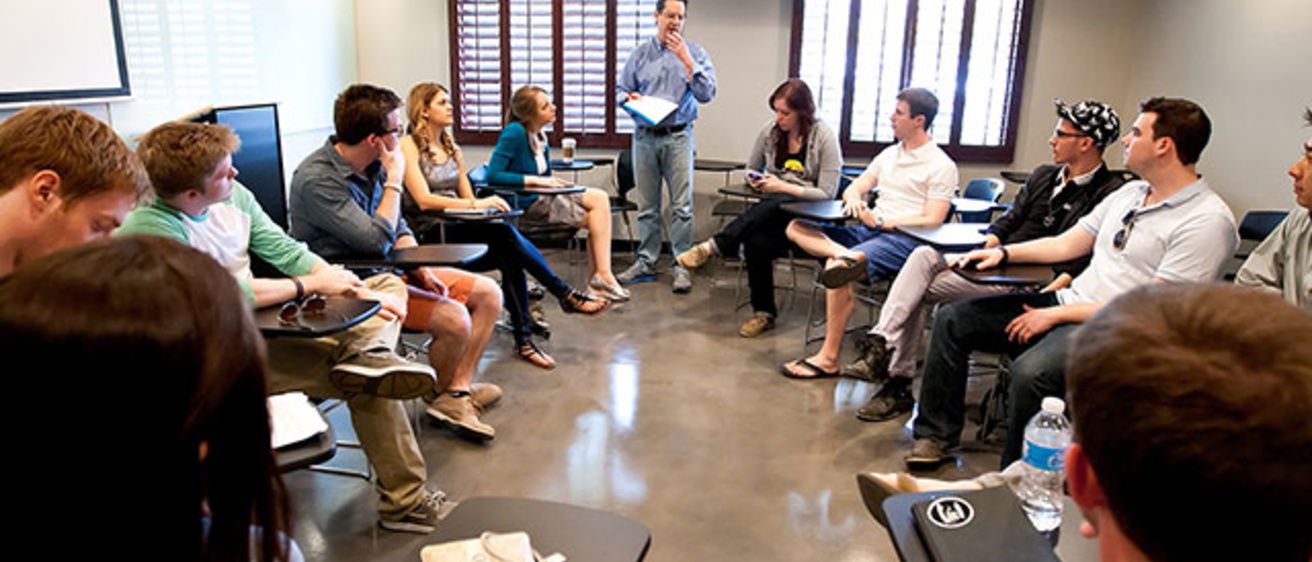It grew out of coffee shops and restaurants, Saturday night brainstorming sessions and weekend road trips. It was wholly organic, slightly sweet, and tastefully refined.
It was Sugarcoat, a food trailer selling vegan ice cream, smoothies, and brownies in downtown Las Vegas, Nev. The brainchild of 14 students and David Gould, a lecturer in the University of Iowa College of Liberal Arts and Sciences' Interdepartmental Studies Program, the entrepreneurial project was the culmination of Reimagining Downtown, a semester-long crash course in teamwork and creativity. It is slated to roll onto the streets of Las Vegas this October.
“It was one of the most rewarding experiences in my entire four years at the University of Iowa."
-Team member and recent graduate Laura Cyrek-
Formed from Gould’s Life Design course, which encourages students to reflect upon the link between personal ardor, career, and happiness, Reimagining Downtown Las Vegas encouraged a group of mostly upperclassmen to add purpose to their passion.
Finding the path to success
“Realizing what you’re meant to do and what you love to do is only step one,” Gould explains. “Once my students found the discipline that spoke to them, I wanted the university to help them discover how to use it in a way that would add value to the world.”
And discover they did. The class had tossed together dance, theater, business, psychology, and health majors, setting the table for an extensive and diverse discourse that would oftentimes lead well into the night and spill over into the weekend.
They needed to formulate a solid business venture, one that would impress Tony Hsieh, the founder and CEO of Nevada-based online retailer Zappos. More than that, the students needed to create something sustainable, a project that would revitalize the Las Vegas downtown area as part of a pet undertaking by Hsieh.
A risk worth taking
Hsieh, who founded the Downtown Project—a $350 million investment to rebuild and re-energize the Las Vegas that exists beyond the infamous Strip—gave the students $50,000. Gould gave them free rein and the chance to make an impact. Together, they brought the students to Vegas over spring and summer breaks, and watched them blossom.
“When we would tell other people about our plan to take undergraduate students to Las Vegas, they thought we were crazy!” says graduate teaching assistant Elizabeth Bledsoe, of Texarkana, Texas. “But when you have a great team and are working with great students, crazy ideas can lead to wonderful things.”
For her pupils, that meant living and working together in Vegas last March, partnering to finalize three business concepts to pitch to Hsieh. By the time spring break had come to a close, the group had become a family, complete with nicknames and a common vision to develop Sugarcoat.
A sweet business
Originally dreamed up by students Rena Troldahl, of Los Angeles, and Laura Cyrek, of Glen Ellyn, Ill., over an early morning breakfast of scrambled eggs, the mobile food station was meant to counter Las Vegas’ obesity epidemic and introduce healthy eating habits to schools and community members.
It was a bold concept, especially considering Las Vegas is known for its all-night buffets and is home to the Heart Attack Grill, a restaurant where patrons over 350 pounds can enjoy menu items for free. Nevertheless, Hsieh invested and the students persisted, partnering with Shane Stuart, a local vegan food chef and up-and-coming juice bar owner.
Born of a serendipitous meeting at a Vegas event that Stuart was catering, the collaboration flourished, and Stuart became both a class mentor and eventual pick to take over responsibility for the business when Gould’s course and his students’ involvement came to an end. Sugarcoat will be operated in tandem with Stuart’s juice bar.
Learning to blend
Stuart encouraged the group to blend vegetables and other raw foods in a manner that many found surprising. Concoctions like kale and spinach brownies or avocado ice cream topped the menu, working their way into the students’ hearts and, eventually, community members’ stomachs. But the concept wasn’t always an easy sell.
“We called it the Trojan Horse of health eating,” says incoming junior Sevy Perez, of Chicago, explaining the group's business model. Perez and his classmates wanted to sell wellness, teaching the people of Las Vegas that raw food could be used in tempting and flavorful ways.
As it turns out, the nosh and the venture were so appealing that even after grades were distributed and spring classes had let out, nearly all of Gould’s students returned to Las Vegas to help their dream of a “pop-up shop” become a reality.
A meaningful end product
A June cohort worked extensively on the food trailer’s business plan, purchasing supplies and establishing key community connections. Classmates who arrived in July focused on marketing and promotions, hosting tastings, cooking contests, and other events.
“It was one of the most rewarding experiences in my entire four years at the University of Iowa,” says Cyrek, who graduated this past May.
Others would likely agree. “[Gould] really pushed the envelope of what a college class can look like,” says social entrepreneur-in-residence Andy Stoll. “His course taught young people how to take an idea and make it happen. In a post-recession world, that’s one of the most important skills you can have.”
